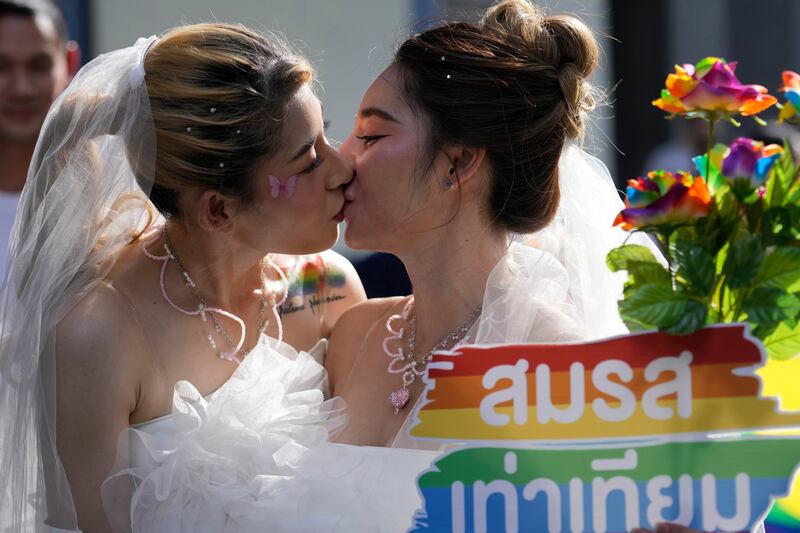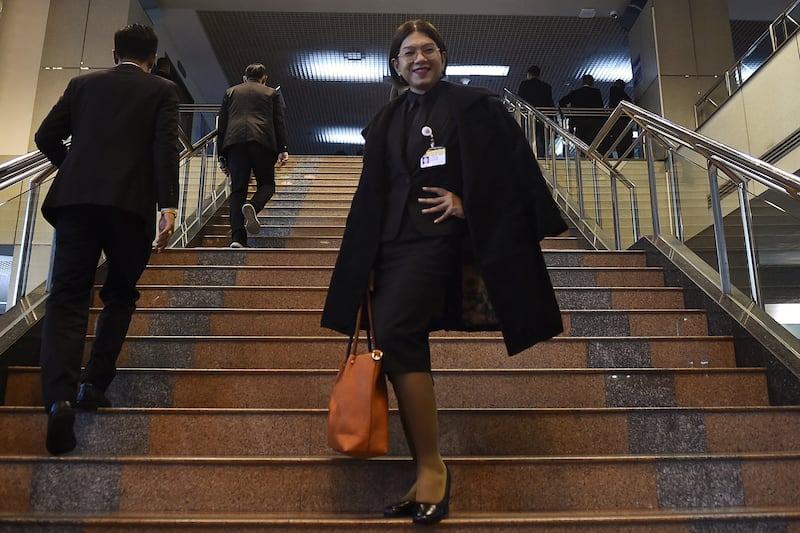Thailand may have a reputation as an LGBTQ haven, but for many queer couples the reality is not as straightforward.
Just ask Orawan Chitram, a transgender man who goes by the name Cake and lives in Bangkok.
The 31-year-old endured years of bullying and rejection as a “Tom” – the Thai slang for a female-bodied person with a male identity. Cake’s relationship with their previousgirlfriend’s traditional family was also strained.
“My ex-girlfriend’s family was ‘anti’ me,” Cake told BenarNews.
“Her parents might have thought there was no security in terms of legality, and she should date someone who could provide that.”
Denied the legal right to marry, Thais in same-sex and non-traditional relationships face a host of disadvantages compared to their heterosexual peers. They cannot adopt children, make emergency health-care decisions on their partners’ behalf, or access a range of spousal benefits, from tax deductions to government pensions.
“This may be one of the reasons that society does not fully accept LGBTQ couples: not only is there discrimination, but there is a lack of legal recognition,” said Cake, who works as a freelance content creator.
That could soon change, however, as lawmakers prepare to debate a marriage equality bill in the the current Parliamentary session. Prime Minister Srettha Thavisin’s cabinet approved the draft law last month.
If enacted, Thailand would become the first country in Southeast Asia to introduce marriage equality and join only Taiwan and Nepal in Asia in recognizing the rights of same-sex couples to wed.
The bill proposes replacing terms such as “husband” and “wife” with “spouse” in Section 1448 of Thailand’s Civil and Commercial Code.
Human rights advocates say the change will unlock a host of hitherto denied legal rights for Thai same-sex and non-traditional couples. It will also better reflect changing social norms, they say, in a nod to Thai society’s largely open attitude to LGBTQ people.
“The level of tolerance in [Thai] society is pretty high, especially compared to a lot of other countries,” Mookdapa Yangyuenpradorn, Thailand human rights associate at Fortify Rights, told BenarNews. “It’s just that the law needs to keep up with people’s attitudes.”

Thailand, a politically conservative country that is primarily Buddhist, has one of the most visible LGBTQ communities in Asia.
Each year thousands of Thais turn out to celebrate Pride Month and the country’s Boys’ Love television dramas are a popular export. Boys’ Love dramas depict a romantic relationship between two male protagonists.
Thai tourism officials, meanwhile, promote the country’s tolerant environment for LGBTQ travelers.
A recent survey by the Pew Research Center, an American think-tank, found that 60% of adults in Thailand supported legalizing same-sex marriage, behind only Japan (68%) and Vietnam (65%) in Asia.
But discrimination, particularly in terms of jobs and healthcare, still exists for gay and lesbian people, said Tinnaphop Sinsomboonthong, an assistant professor at the Faculty of Sociology and Anthropology of Thammasat University in Bangkok.
“It is also sad to be aware that, at the governmental level, the LGBTQ community and LGBTQ lifestyles in Thailand have been used as commodities to attract more foreign LGBTQ tourists to visit the country,” Tinnaphop said. In that regard, he said, LGBTQ people are not seen as “valuable human beings who deserve the equal basis of rights like heterosexual people.”
An earlier draft marriage equality bill, introduced by opposition lawmakers from the progressive Move Forward Party, reached its second reading in November 2022, but didn’t move beyond that because of a series of legislative delays after which the Parliament was dissolved in March ahead of the May general election.

Backers are more optimistic about the proposed law making progress in Thailand’s bicameral Parliament this session, particularly because Srettha supports it.
“I believe that everyone should be entitled to equal rights, regardless of their gender,” Srettha said on X, formerly called Twitter, in October.
He added that the government was working towards Bangkok being the host for World Pride 2028.
But opposition from religious groups and conservative lawmakers, including senators in the upper house appointed by Thailand’s former junta, is expected to be an obstacle.
The Prachachat Party, which is popular in Thailand’s Muslim-majority Deep South, said it would vote against the bill.
“The bill does not represent the agreement of all allied parties,” party spokesman Kamolsak Leewamoh told BenarNews.
“Even though we are in the coalition, we would oppose the bill because it is inconsistent with Islamic teachings.”
Should the Parliament enact the law, it would then be sent to the Constitutional Court – another conservative Thai institution – for adjudication on its constitutionality.
In 2020-21, LGBTQ activists played a prominent role in pro-democracy protests that called for the resignation of then-Prime Minister Prayuth Chan-o-cha and reforms to the monarchy. Gender and marriage equality were seen as inseparable from the movement’s demands for a truly democratic society.
Cake, the content creator in Bangkok, said marriage equality could have a potentially transformative effect on people’s attitudes in Thailand. And although Cake and their partner would not necessarily rush to wed if the marriage equality bill were to pass, they would cherish that they had the right to do so.
“[We’re in favor] of the law’s practical benefits that regular male-female couples enjoy,” Cake said.
“Secondly, the intangible aspect of the law is that we have the right to choose.”
Mariyam Ahmad in Pattani, Thailand, contributed to this report.
